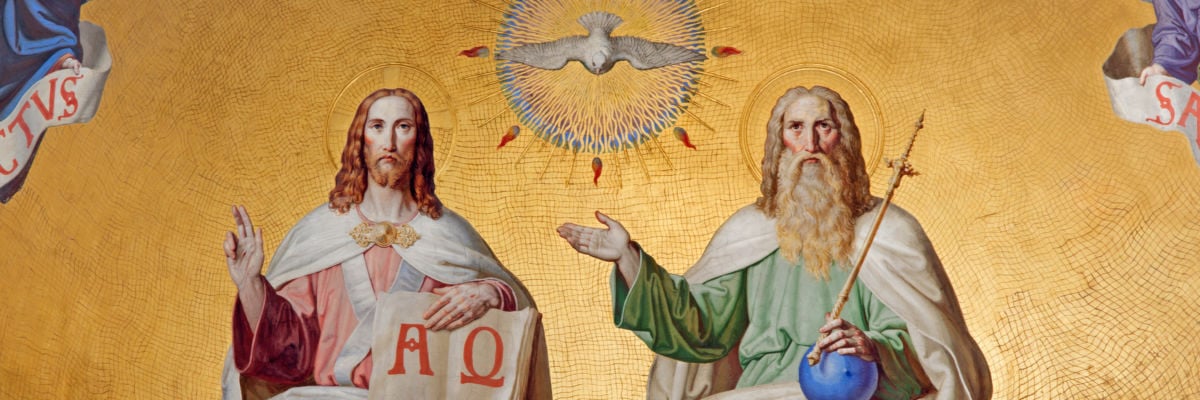
Christians talk about God’s law all the time, as well they should. God’s law is designed to lead us in his will and to make us happy.
But people often don’t have a good handle on the nature of divine law, and problems result. A bit of background can help prevent some of these problems.
The first thing we need to understand is that God doesn’t have just one body of law. He has several that we know of—probably more that we don’t. That’s not surprising. Even a nation like the United States has different bodies of law governing different aspects of life in America. There’s international law, federal law, state law, and municipal law.
Theologians refer to God’s ultimate law as the eternal law. Aquinas explains that “the eternal law is nothing else than the type of Divine Wisdom, as directing all actions and movements” (ST I-II:93:1). All other, lesser laws, whether divine or human—to the extent that they are laws—participate in some way in the eternal law.
One part of the eternal law is what theologians refer to as the natural law. In the sciences, the phrase natural law is often used to refer to those principles pertaining to non-living or non-intelligent things in the universe. This isn’t the case in theology. In theology, the term is used to refer to those moral precepts of the eternal law that a rational creature can discern without special revelation. For example, the fact that murder, theft, and lying are wrong can be discerned by human reason without special revelation and so the prohibitions against them constitute part of the natural law.
Just because something can be discerned without special revelation does not mean that it always will be so discerned, so it is useful to have law that is given by special revelation. Laws that are promulgated by words—whether written or oral—constitute positive law. God has chosen on two major occasions to give to man bodies of divine positive law.
The first of these was when God gave the Jewish people the laws of the Pentateuch or Torah. The second was when he gave us the laws governing the Christian dispensation. Biblically, the former body of law is known as the Law of Moses (1 Cor. 9:9, Heb. 10:28), and the latter is known as the Law of Christ (1 Cor. 9:21, Gal. 6:2). They have come to be known in theology as the Old Law and the New Law.
There has been a misimpression on the part of many that in some sense all men were bound to obey the Old Law before the time of Christ. This is not the case. The Law of Moses was always and only meant to be observed by the Jewish people. We see in the Old Testament many non-Jews who were worshipers of the true God, such as Melchizedek the Jebusite and Jethro the Midianite, who were both priests of God (Ex. 3:1, 18:12), Balaam the Pethorite, who was a prophet of God (Num. 22:18–19), and Naaman the Syrian, who came to worship God and was in no way asked to embrace the Mosaic Law (2 Kgs. 5:15–19).
The specificity of the Old Law to the Jewish people is also illustrated by the precepts in the Torah that pertain to the civil life of Israel. For example, Numbers 35:2 commands the building in the land of six cities of refuge to be controlled by the Levites.
The Old Law includes certain precepts of natural law. All of the Ten Commandments, for example, are either direct expressions of natural law or, in one case (that of the Sabbath commandment), a particular application of a natural law principle. Because the natural law is binding for all time on all people and never changes, those natural law precepts of the Old Law are also binding on non-Jews. This is why they get quoted in the New Testament as obligatory for Christians and which is why we continue to quote them today.
What happens, though, is that people end up forgetting that the reason they are binding on us is that they are part of natural law. People hear the verses quoted and think that they are binding because the Old Law says them. Aquinas explains: “The Old Law showed forth the precepts of the natural law, and added certain precepts of its own. Accordingly, as to those precepts of the natural law contained in the Old Law, all were bound to observe the Old Law; not because they belonged to the Old Law, but because they belonged to the natural law” (ST I–II:98:5).
When you understand this fact, it cuts through a bunch of the problems people fall prey to when looking at the New Testament’s use of the Old Law. People will mistakenly ask, “In what way is the Old Law binding on us today?” This question is framed wrong. It assumes that there isa way in which the Old Law is binding on us, and there’s not. The Old Law itself is binding on no one, and, unless one is Jewish, never was.
Those who do not have this insight—and this is especially common in conservative Protestant circles—often get bogged down in elaborating the different kinds of precepts found in the Mosaic Law and discussing which are or are not binding on us today.
For example, there is a common way of classifying the precepts of the Mosaic Law according to whether they are moral, ceremonial, or judicial (in Protestant circles this last category is often called civil).
The moral precepts are those most directly demanded by natural law, such as the prohibitions on murder. The ceremonial precepts are those that deal with the regulation of worship in Israel, such as how sacrifices are to be offered or when holy days are to be kept. The judicial precepts deal with the actions of rulers, of citizens with respect to other citizens, of relations with strangers and foreigners, and of the home life (ST I-II:104:4).
A common Protestant position is that the moral precepts are binding on us today but the ceremonial and civil precepts are not. Others (theonomists) will hold that the judicial precepts are binding, though perhaps with minor modifications. And a very small number even holds that some or all of the ceremonial precepts are binding to day as well.
This division of the precepts of the Law into three classes has even led some (many in Presbyterian circles) to speak as if there are three separate laws in the Torah—”the moral law,” “the ceremonial law,” and “the civil law.” This is completely unbiblical.
The Torah is one corpus of legislation, not three. The moral/ceremonial/judicial scheme is a convenient but arbitrary way of classifying its precepts. There are other ways in which the precepts can be classified. For example, the common method of classification used by Jews divides the precepts into two classes—those that are commands (“Thou shalt . . .”) and those that are prohibitions (“Thou shalt not . . .”).
When one understands that that the moral precepts are binding on us because they are demanded by natural law, one is no longer dependent on figuring out which is the “right” Mosaic Law classification scheme for the precepts. Instead, one needs to ask: “Is this precept demanded by reason?”
There is also the special case of precepts that are applications of natural law precepts—for example, the Sabbath command. There is no natural law reason why one should rest and worship on Saturday rather than another day, but there are natural law reasons why one should devote adequate time to rest and worship. Consequently, we are not bound to observe the Sabbath day, but we must still observe the natural law requirements for rest and worship.
The Roman Catechism makes this point in its discussion of the Sabbath command: “The other Commandments of the Decalogue are precepts of the natural law, obligatory at all times and unalterable. Hence, after the abrogation of the Law of Moses, all the Commandments contained in the two tables are observed by Christians, not indeed because their observance is commanded by Moses, but because they are in conformity with nature which dictates obedience to them.
“This Commandment about the observance of the Sabbath, on the other hand, considered as to the time appointed for its fulfillment, is not fixed and constant, but changeable, pertaining not so much to mores but to ceremonies. Neither is it a principle of the natural law; we are not instructed by nature to give external worship to God on that day, rather than on any other. And in fact the Sabbath was kept holy only from the time of the liberation of the people of Israel from the bondage of Pharaoh.”
With the coming of Christ, the Law of Moses was abrogated even for the Jewish people. Jesus “canceled the bond which stood against us with its legal demands; this he set aside, nailing it to the cross” (Col. 2:14). Paul tells us that we must ” let no one pass judgment on you in questions of food and drink or with regard to a festival or a new moon or a sabbath. These are only a shadow of what is to come; but the substance belongs to Christ” (Col. 2:16).
Rather than fulfilling the Law of Moses, Paul points us toward fulfilling the Law of Christ: “To those outside the [Mosaic] law I became as one outside the [Mosaic] law—not being without law toward God but under the law of Christ—that I might win those outside the [Mosaic] law” (1 Cor. 9:21). He wrote also, “Bear one another’s burdens, and so fulfil the law of Christ” (Gal. 6:2).
The Law of Christ, or the New Law, is the second major revelation of positive divine law. It contains the laws set forth by Christ and the apostles in the deposit of faith. Some of these are moral (prohibitions on murder, adultery, and polygamy), some ceremonial (baptism, the Eucharist, Sunday worship), and some are civil or judicial (e.g., “Let every person be subject to the governing authorities”—Rom. 13:1—and the Church’s social teaching as grounded in the deposit of faith).
The New Law also provides something that the Old Law did not: the grace of the Holy Spirit, who empowers individuals to keep the New Law in a way that those under the Law of Moses were not able to keep it. This internalization the New Law was prophesied by Jeremiah: “this is the covenant which I will make with the house of Israel after those days, says the Lord: I will put my law within them, and I will write it upon their hearts; and I will be their God, and they shall be my people” (Jer. 31:33).
Finally, we should mention two other manifestations of divine law—civil law (international, national, state, and local laws) and ecclesiastical law (e.g., canon law and liturgical law). To the extent these are laws, they participate in the eternal law and we are bound by God’s authority to obey them. Thus immediately after telling his readers “Let every person be subject to the governing authorities,” Paul explains this by saying “For there is no authority except from God, and those that exist have been instituted by God.
Therefore he who resists the authorities resists what God has appointed, and those who resist will incur judgment” (Rom. 13:1–2).



